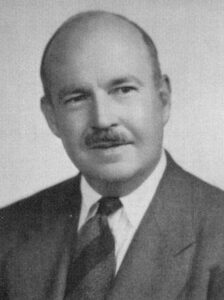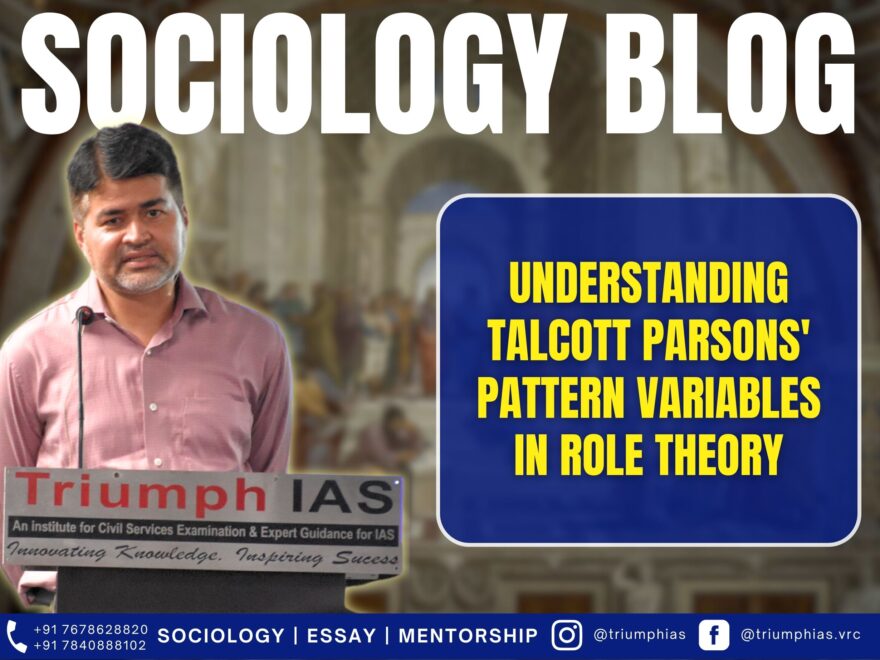
If observed facts of undoubted accuracy will not fit any of the alternatives it leaves open, the system itself is in need of reconstruction.
Pattern Variables
Relevant for Sociology Paper-1 (Unit-4)
The role plays a crucial role in the social system, and its performance creates tension and strain. The level of tension depends on how societal expectations of roles are established and the extent to which individuals embrace these values. When it comes to motivation and values, actors encounter dilemmas while fulfilling their roles. These dilemmas arise from the conflicting choices and preferences individuals face regarding their needs and values. If these dilemmas are binary in nature, actors must make a choice between options before taking action in a given situation. For instance, when faced with a situation that requires choosing between universalistic values and particularistic values, actors can only select one of them.
Parsons explores five pattern variables for defining roles, acknowledging that there could be additional possibilities.
- Emotional Involvement versus Emotional Neutrality
- Individual Focus versus Group Focus
- Universality versus Uniqueness
- Assigned Status versus Earned Status
- Specificity versus Broad Scope
- Affectivity versus affective neutrality: The dilemma arises when deciding whether to prioritize immediate personal satisfaction (affectivity) or to forego immediate gratification in favor of moral considerations (affective neutrality). According to Parsons, actors require gratification, but at the same time, an organized action system necessitates the renunciation of certain gratifications available in a given situation.
- Self-orientation versus collectivity orientation: The central issue revolves around moral standards in the evaluation process. Actors face a choice between pursuing personal gratification or sacrificing it for the benefit of a larger collective. This pattern variable has been present throughout human history, from primitive economic and social structures to modern civilization. Socialist societies, for example, exemplify a collective orientation, but as Parsons highlights, the institutionalization of such values is always fragile.
- Universalism versus particularism: This pattern variable defines role situations where actors face a dilemma between cognitive evaluation (based on universal standards) and emotional evaluation. Roles adhering to universalistic standards strictly abide by legal norms and sanctions. If someone follows the rule of law regardless of personal, familial, or friendship considerations, they exhibit universalistic role performance. On the other hand, particularistic considerations come into play when legal norms are violated due to personal connections. Parsons notes that in societies where formal organizations and modern institutions, such as bureaucracy, have become prevalent, the dilemmas of universalism and particularism permeate everyday life.
- Ascription versus achievement: The dilemma in this pattern variable arises from whether actors define their role objects based on inherent qualities or performance. The caste system in India provides a prime example of role performance governed by ascription. Ascription assigns certain qualities to individuals based on birth, age, gender, kinship, or race. On the other hand, achievement is based on personal acquisition of skills and levels of performance in society.
- Specificity versus diffuseness: The specificity versus diffuseness pattern variable relates to the scope of role performance. Scope, in this context, refers to the nature of social interaction. Some social interactions, such as those between doctors and patients or buyers and sellers in a market, have a specific scope defined by a precise context. On the other hand, certain role relationships are more general and encompassing, such as friendship, conjugal relationships, and relationships between various kinship ties. The scope of these interactions is flexible, open, and all-encompassing in nature.
Analysis:
- The pattern variables not only define the nature of role interaction and role expectations in a social system but also indicate the general direction in which most members of the system choose their roles. They provide insights into the nature of the social system itself. For instance, let’s consider the family as a social system: the role expectations among family members can be described as affective, primarily focused on collectivity, particularistic, ascriptive, and diffuse.
- On the other hand, if we look at our membership in professional associations like medical associations, bar associations, or student associations, the role expectations and standards of role performance would largely align with the pattern variables of affective neutrality, self-orientation (due to competition), universalism, achievement, and specificity. However, these are extreme examples. In reality, the choices and dilemmas related to pattern variables are much more complex and challenging than the examples mentioned.
- The dilemma of role performance arises when evaluating a situation. How much should a situation be evaluated based on emotional considerations versus emotional neutrality? This presents a difficult choice in many roles we are expected to fulfill in society.
- Take, for instance, the mother-child relationship. It involves a high degree of affective orientation, but discipline is also necessary. Therefore, a mother often has to exercise an affective-neutral role when it comes to her child’s socialization. However, the mother-child relationship is fundamentally characterized by affectivity. In comparison, the doctor-patient relationship highlights the aspect of affective neutrality inherent in a doctor’s role.
- Affective neutrality is crucial for providing proper medical care, especially in surgical treatments. Nevertheless, according to Parsons, in all role performance situations, the dilemma of choice and the extent of its expression or commitment persist.
- Talcott Parsons’ concept of pattern variables bridges the gap between social action and the social system. The combination of solutions offered to these dilemmas characterizes a social system. These pattern variables structure any system of interaction.
To master these intricacies and fare well in the Sociology Optional Syllabus, aspiring sociologists might benefit from guidance by the Best Sociology Optional Teacher and participation in the Best Sociology Optional Coaching. These avenues provide comprehensive assistance, ensuring a solid understanding of sociology’s diverse methodologies and techniques. Sociology, Social theory, Best Sociology Optional Teacher, Best Sociology Optional Coaching, Sociology Optional Syllabus.
Talcott Parsons, Pattern Variables, Role Theory, Social System, Societal Expectations, Emotional Involvement, Group Focus, Universality, Assigned Status, Specificity, Affectivity, Collectivity Orientation, Universalism, Ascription, Achievement.
Follow us :
🔎 https://www.instagram.com/triumphias
🔎https://www.youtube.com/c/TriumphIAS
https://t.me/VikashRanjanSociology
Find More Blogs
|
Scope of the subject and comparison with other social sciences |
|||
|
|
|
|
Modernity and social changes in Europe |

